Elena Govor
AUSTRALIA AND THE CRIMEAN WAR
The Crimean War which broke out thousands
of miles away from Australia, the war in which only a handful of Australians
participated, left its impact on all layers of the colonial population,
which gave the mother country its moral and material support. This war
strongly influenced the formation of the Russian image in the Australian
minds. Never before the Australian newspapers had written so much about
Russia, never before the Russian Czarism had been condemned by such a mass
of people during populous meetings. The war had also left visible legacy
– the map of Australia is still decorated by Russian names which appeared
here during a military action on another end of the Earth.
In the meantime, from the very beginning
of the war there was no full unanimity in its appraisal in Australia. For
example, an interesting discussion developed during a populous meeting
in Sydney on the 22 May 1854, shortly after the knowledge of the English
entry into the war had reached Australia. The attendants of the meeting
had been already prepared to support a loyal address to Her Majesty, expressing
their "hearty approval" and readiness «to submit to the calamities
of war in defense of the great principles of national independence and
general civilization» when a priest named J. Lang stood out and declared
that this address is «piece of sheer absurdity» and nothing
else that «was a virtual declaration of war on the part of this puny
colony against the whole Russian Empire... one of the most powerful nations
in the world». Lang was proving that a colony isolated from the rest
of the world should not 'in any way mix up in the disputes pending between
the mother country and Russia'. 'What have we to do with the quarrels between
Russia, Turkey and France?» - he was asking his listeners. Moreover,
Lang did not hesitate to encroach upon the most sacred and to put up a
question: «After all was this a righteous war?», showing the
audience roaring of indignation that in reality the aim of the war was
not quite the defense of civilization and liberty in Europe. England had
done nothing when Czarism was brutally thwarting freedom in Poland and
Hungary, which were not of any strategic interest for her, why do we have
to defend Turkey now? – he was asking his opponents. Although his speech
had stirred a storm of indignation, he found a group of adherents – those
who stood at the source of Australian nationalism, identifying themselves
as an independent nation, not a simple appendix of England. No wonder,
that the Lang’s opponents on behalf of which a renown Australian politician
Henry Parks spoke, had nothing to object with beside the following: «What,
and are we no longer Englishmen?» John Lang, "the minister of piece",
as he was mockingly called by the opponents, actually, had become the spiritual
father of the modern Australian pacifists.
A Lang’s contemporary, a renown Australian
poet Charles Harpur, which was confident that this war was «undertaken
to uphold one despotism against another», shared Lang’s feelings.
He wrote in his poem «Battle of Inkerman (the most authentic version)»,
that France and Britain «Despite of Waterloo, Combined against one
foe, For what they hardly know». He also wrote satirical poems, dedicated
to one of the "spread-eagle" meetings. But it would be fair to say, that
neither Lang, nor Harpur championed Russia. The pathos of their speeches
was targeted at the hypocrisy of the Australian society. As the war was
grew more protracted and blood-spilling, a critical attitude towards it
began to grow in both England and the colonies.
The Australian image of Russia was
very vague at the time. An influential newspaper "Sydney Morning Herald"
wrote at the beginning of the war: « Among our readers are many to
whom the Russian Empire is known only as a name; to others it presents
only the image of a gloomy despot carrying a knout, or a poor exile shivering
in a snow storm... There are many things... which perhaps in England are
not necessary to be told, [but] which have been forgotten by people who
have to kill their own mutton.».
During the war the image of Russia
was formed under the influence of several factors, and, of course, most
of all, under the influence of England, and, hence, her Australian colonies,
being at war against Russia. This set of stereotypes is not of a great
interest, as epithets, applied to the Russians, could have been related
to any nation which had become an enemy at the moment. It was demonstrated
most vividly by a nun, which lived in the family of William Denison – the
Governor of Tasmania at the time. Before, when rebuking a kid she looked
after, she would have called him "a little Turk", with the beginning of
the Crimean war he had become "a Russian". At a higher level the newspapers
spoke of «unrighteous» or «monstrous invasion»
of the Russians, «the aggression of the strong upon the weak»,
«Russian intrigue... in Paris and Vienna», «Russian insolence»,
portraying Russia as an aggressor, covering himself with words about the
"holy war". "Russia, the enemy" had become the leitmotif of numerous patriotic
meetings.
Simultaneously publications targeted
against the Russian political system, turned out. Their intonation had
been set out by an article in which it was noted, that the oncoming war
would not be against the Russian people, but at the political system, and
it would kindle a light of liberation over Russia. Such cliches and characteristics
as «tyranny and oppression», «the Northern despotism»,
« the despotic authority» may be noted as the most typical.
The Russian Czar was called by newspapers not less than "the Autocrat of
the Russians", "the Muscovite Autocrat", "the Russian despot". Some articles
pointed out the influence of the political system on the condition of the
army: «the Russian soldier knows that he can never be but what he
is - a serf in uniform», Russian army is "suffering from an inefficient
commissariat and a defective system of discipline». The Australian
politicians and publicists invariably contrasted the Russian despotism
and the "'the constitutional liberties of the nations of Europe", and,
of course, England and her allies were shown as adherents of the "the cause
of justice and humanity", fighting «in defense of liberty all over
Europe».
And, at last, at the time ethnic stereotypes
and biases, creating an absolutely inadequate image of the Russian people,
filled the pages of the Australian media. The definition "barbarians" had
become one of the most in relation to the Russians. For example, the following
cliches such as «hordes of barbarians», "the most barbarous
nation in Europe" were constantly heard during the mentioned above meeting
in Sydney. "The Russian Bear" was figured out a bit rarer. A statement
that «the Russians have, unfortunately, a dogma, which not only exists
in the brains of their statesmen, but which forms part of the pride and
fanaticism of their people. They believe they are destined to subdue the
earth, and to impose upon it the verities of their religion» was
not that stilted but no less unsubstantiated.
Yet a credit has to be given to the
Sydney-siders which in reply to the primitive anti-Russian propaganda,
buried "Sydney Morning Herald" by a series of smart cartoons. The image
of the Russian "barbarians" was drawn to full grotesque in one of them,
titled as "Penelope": «Those horrid Russians are coming to batter
down our houses, and carry us women away and make slaves of us, with their
nasty moustaches and beards, and condemn us to live upon bears' grease
and tallow». Sometimes Russian researchers mistake this Australian-made
"black humor" for something heartfelt. In common, the black paint in the
presenting of all Russian dominated but was not all alone. An attentive
reader would have noticed bits of objective information, showing sympathy
to some Russians as well as gallantry of the Russian soldiers and seamen.
Nevertheless, despite all jokes of jovials and individual attempts of the
objective approach to the Russian issue, all three groups of the anti-Russian
perception – Russia as a foe, Russia as a country of despotism and Russia
as a land of relative barbarians – dominated in the Australian mind and
were permanently heated up by information from the war zone.
The first "Russian Panic", caused by
the fear of a Russian invasion, befell on the Australians simultaneously
with the first news on the oncoming English participation in the war (March-April
1854). Fright before a foreign invasion, occupation of seaport towns, which
became especially substantiated after the discovery of gold in Australia,
has gone through the whole history of the country. Before the Crimean War
France, Russia and America had been thought to be the most dangerous potential
enemies, whilst just before the Crimean War France and America had seemed
to be more real foes than Russia. The force of inertia was so strong, that
already after the outbreak of the Russo-Turkish war the Australian colonies
kept building their defense doctrine based upon the inferred French threat.
For example, J. Lang declared at the meting, that «Louis Napoleon,
the Emperor of France, at his stronghold in New Caledonia, a far more dangerous
enemy to [our] trade and commerce in the Pacific than any other power in
Europe». The Australian fear of a possible raid of American privateers
(capers) did not disappear either. And, nevertheless, particularly the
threat of a Russian invasion caused a real panic in the Australian colonies.
"The Russian Fear" had befallen on
Australia not just once during the whole second half of the XIX century
– in 1863, 1870, 1882 and 1885. But the first panic, experienced by the
Australians during the Crimean War, was the strongest and most remembered.
What kind of form didn’t it take! Some newspapers, for example, discussed
quite seriously which city – Sydney or Melbourne – the Russians would attack
and what kind of attack it would be: destruction of cities, their occupation
or only capture of gold in banks, and also who would carry out the occupation
of Australia – buccaneers, privateers or navy. That or this variant was
preferred in connection with the movements of the Russian squadron in the
Pacific. The panic befell on all strata of the Australian society. J.C.
Breillot, the chairman of the Defense Committee dreamed of «emissaries
from Russia might even now be here, noting the defenseless state of our
harbor", inhabitants of the coast had "visions of a Russian frigate or
steamer, coming... in quest of gold". At times the panic took a bizarre
character – from fears of a drunk from Adelong who was going to commit
suicide as he had thought that the Russian had already imprisoned him,
to a mass panic in Melbourne on the 7 September 1854, when somebody, having
heard explosions of feast crackers, yelled "Russians!". The news instantly
spread all over the town, and soon gallant detachments of volunteers, armed
with anything, headed towards the coast, but, of course, found nobody there.
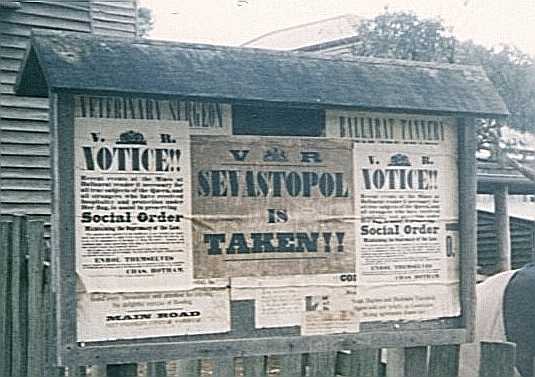
An outdoor museum in the outskirts
of the town of Ballarat (Victoria), which is called Sovereign-Hill. One
of the major gold rushes in the world history broke out here. Its peak
happened during the Crimean War. You see a notice board for the administration
announcements and posters. In 1855 the colonial administration advised
the town population by such a placard (author’s photo) that Sebastopol
had fallen what meant the end of the war. Many gold diggers and their family
members had brothers, fathers or sons in the British Army.
Some more examples of the Australian
freight before the threat of a Russian invasion may be adduced – they (Australians),
for example, remembered with fear the visit of a Russian naval ship "Dvina"
which had called in Sydney in May-June 1853, just before the war, and suspected
it of espionage, - but it has to be recognized that in the Australian society
there were always sober heads which understood the groundlessness of the
Russian threat and called their countrymen to think, how could the crew
of the Russian ship have practically captured and held the Australian town,
how could it have broken through a huge crowd down the streets of an unfamiliar
town to a bank, let alone that enormous distance between Russia and Australia
and the very naval weakness, which had become obvious at the time.
Did the threat of a Russian invasion
in Australia any ground in reality? The writer I.A. Goncharov, who served
on the "Pallada" frigate in the Pacific during the Crimean War, seemingly,
confirmed, that the fright of the Australians had some grounds:
As far as I remember the admiral
and the captain repeatedly decided to carry out a bold raid on Australian
shore for the seizure of English vessels and it seems to me/ if I am not
mistaken, it was only uncertainty that our good old Pallada would be able
to bear up prolonged navigation from Japan to Australia that deterred them;
and also, of course, uncertainty, because of lack of any news, of being
able to catch any foreign vessels there.
A historian from St Petersburg Alexander
Massov was the first who tried to resolve this issue on the basis of data
from the Russian State’s Naval archive. Long-term research enabled him
to affirm with all possible confidence that during the Crimean War and
the following decades "no concrete plans of attack on the fifth continent
existed. The issue of any actions on the Australian shores was not even
raised either during discussions in the Naval headquarters or in appropriate
instructions of the Commander of the pacific Squadron." An attack on Australia
was impossible due to its remoteness and lack of sufficient resources in
the Russian navy. That’s why only naval blockade of the enemy’s trade routes
in the Pacific was in the tasks of Russian naval ships.
Meanwhile the Australians were preparing
to defend themselves from a Russian invasion. Loud speeches full of bragging
and neglect of the Russian forces were heard at meetings. «Should
a Russian frigate enter the harbor with any view to aggression, she would
leave her planks to rot», - J.B. Darvall threatened and Sir Thomas
Mitchell convinced the attendees that «old as he was, he had yet
some vigor left in him, and cheerfully would he lead a boarding steamer
against any Russian opponent that should enter the harbour. He would take
the pike in hand and with a firm and steady band of armed Australians at
his back, he would have no fear of its result». Yet there was no
unanimity in relation to defense in the Australian society, and financing
of it was the obstacle. So, someone hidden under cover of alias «Very
defenseless» approached the defense issue from class positions, affirming
that only rich owners of gold will suffer of the invasion: «The richer
the man, the greater the sufferer... It is of very small consequence to
the mass of people in this country whether the French, Russians, or Turks
come and walk into the gold-lined vaults». Already many times mentioned
Lang approached the issue from the other side claiming for more independence
from the mother country: « give us the form of government we require
and we shall do all in our power to defend it».
The threat of a Russian invasion made
many Australians to take part in discussions of the defense issues in newspapers.
Apart from serious proposals, which were later considered in the Parliament,
some kind of "defense-from-the-Russians" folklore turned out. It was a
specific Australian reaction on the fashionable Russophobia. "Pater familias",
just another joker, told touchingly in his letter to the editor of "Sydney
Morning Herald" that his « has told her mamma that she cannot sleep
for dreaming of Russian officers», and already mentioned "Penelope"
suggested that feather beds would be the best protection from the Russian
guns. Let the Governor issue a decree, and every Sydney-sider would hang
feather beds on posts all along the coast, and cannon balls would not get
through. The newspapers mocked over the especially patriotic editor of
«Goulburn Herald», describing as if he is expecting arrival
of terrible Cossacks which would make their way with a news that a Russian
Admiral Knockymdounouski (just a would-be-Russian ) was already chairing
in Sydney in the Government House and had sent a Czar’s (sic!) a decree
on deportation of all people of Goulborn to the snowy wastes of Siberia.
And a basket vendor began to promote his shop in a newspaper with a poem:
The Russians are coming, and we propose
To treat them as friends and not as
foes;
For why should we go killing and eating
These men, while we have so many sheep
bleating?
Men of the mind can turn to good uses
Even their enemies vilest abuses;
Then dolts must we be if we can't make
a profit
Of this Russian invasion, and think
nothing of it...
This poem ended wit an invitation to come
and buy baskets in the shop.
Sober-minded Australian politicians,
probably, were not too different from this vendor. They did not succumb
to the all-out panic or recklessness and skillfully conducted their defense
doctrine, successfully exploiting the very prejudice of the Australians
towards the Russians. For example, an Australian politician William Denison
wrote to his friend Robert Murchison: «You laugh, and with reason,
at the panic which led people in these colonies to insist upon fortifying
themselves against the Russians. I never partook of this panic, but I have
gone into the question of the defense of Sydney for the purpose of keeping
off more unpleasant neighbors than the Russians; namely our friends the
French, and our relations the Americans... Of Russia I have not the slightest
fear...». And nearly simultaneously he requested London to provide
arms to defend the Australian colonies buccaneers flying the Russian flag»,
and Fort Jackson built during his reign, had entered the history as a fort,
built specifically for the defense from the Russians and had become a symbol
of vain Australian fears.
Such forts "against the Russians" may
be found all over the Australian coast from Cape-York to Hobart and from
Sydney to Adelaide. Strangely, most of Australians know from the whole
variety of the Russo-Australian contacts in the XIX century only one aspect
– the fear of a Russian invasion. In the meantime the historians have known
for long that in reality it was not that simple. The Mass historic memory
of the Australians about the defense fortifications against the Russians,
which survived till now and immortalized in brochures for tourists and
popular comments is not more than a result of skillful political influence
upon the public consciousness. In reality the coastal forts were a part
of common defense system which is built by any state. The problem was in
financing of the fortification work. They often commenced well before a
scheduled strike of fear of a Russian invasion, then lasted for many years,
and their financing was endlessly discussed in the Parliament, but nothing
was done. And only another regular strike of panic before an "oncoming
Russian invasion" would help make both English politicians and ordinary
Australians open their wallets, and a fort, of course, would become famous
as built against the Russians.
Why was it the bugbear of the Russian
threat (unlike the American or French ones) which effected the mass consciousness
of the Australians so successfully? In this case it had been caused by
the influence of not quite a real threat, but of the Australian perception
of Russia and the Russians and the negative image of the Czarism which
oppressed its own people and conducted expansionist politics on the world
arena, and the intimidating geo-ethnic image of Russia as a huge country,
populated by numerous semi-wild peoples, and the very image of the Russian
people being so much different from other Europeans externally and in terms
of religion.
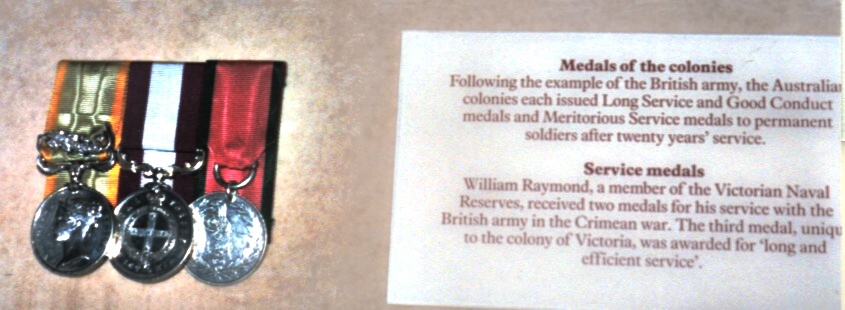
An Australian from Victoria
William Raymond was awarded with two medals including one Turkish) for
his service in the Crimean campaign. The third one was "For the Long and
Efficient Service" (an author’s photo from the Australian War Memorial).
Only a small number of Australians
took part in the war due to the obvious reasons. Some of them are known
from newspaper articles of that time: William Moriarty, whose parents lived
near Sydney; Sydney-born John Phelps – his name was later mentioned among
the participants of the Rangiriri battle between a British regiment and
Maori warriors during the rebellion of the Waikato tribe in 1863. The reporters,
of course, watched attentively the military career of the Governor Fitzroy’s
son who used to be his father’s assistant in his time. He was drafted to
the army in 1853. On the 20 February 1855 the "Herald" newspaper wrote
that he had distinguished himself at the very beginning of his career and
been wounded at Alma, then – badly – at Inkerman. On the 21 January 1856
"Herald" advised of his death in combat. There is one more historic personality
– Colonel John Richardson (later General-Major), the Crimean war veteran.
At an age of 48 he took command over the Australian contingent from NSW,
which participated in the Anglo-Sudanese war (spring of 1855). There were
quite a few Crimean war veterans among the Australian volunteers in Sudan,
but now it is too hard to distinguish colonials and British immigrants
among them.
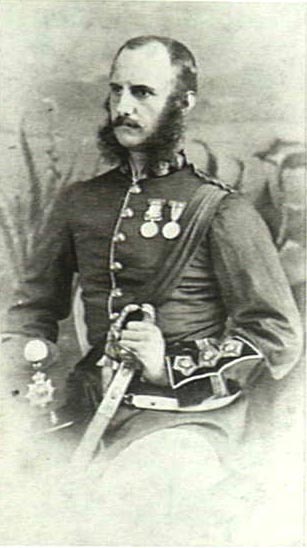
An unknown officer (possibly,
John Phelps) of the 50th regiment based in Sydney in 1866-1869
after the service in New Zealand. Insignia on the cuff and collar indicate
his captain’s rank, and the medals – his participation in the Crimean War
(from the book The Australian Army, Navy and Air Force in Eleven Wars,
1994)
The Crimean war left a noticeable impact
in the Australian geography. During the War Australia was literally flooded
by the Russian names as new territories were developed, new gold mines
opened and new streets built. There are the towns of Alma and Balaklava
in South Australia, Sebastopol – in NSW, an Alma lake in South Australia.
Queensland is also rich of Crimean names: there are at least eight towns,
rivers and mountains named Alma there. There also Inkerman, Balaklava,
Malakhoff Range. Let’s add that the Crimean names are abundant among the
streets of Melbourne, Sydney, Perth and other cities. For example, the
Eastern part of the St Kilda suburb in Melbourne are crossed by three major
arteries – Balaklava, Inkerman and Alma, and between them there are the
Odessa, Crimea, two more Alma, Sebastopol Malakhoff streets and the Alma
park. In the adjacent suburb of Caulifield there are the Sebastopol, Malakhoff
and Crimea streets. Similar bundles of the Russian names may be found in
other suburbs of Melbourne. Some towns and streets carry names of commanders
of the Allied troops which fought in Crimea – Saint Arnaud (French General),
raglan (commander of the Allied troops who died of cholera during the war)<
Cardigan (commander of the infamous Light Cavalry Brigade which suffered
heavy losses from the Russian artillery during a mindless frontal attack).
Soon after the war an English traveler Charles Dilk found that knowing
the main events of the Crimean War one can trace the sequence of settling
in Victoria: «Saint Arnaud—is a town between Ballarat and Castlemain,
Alma is nearby, whilst the Balaklava Hill is near Ballarat, where there
are also raglan and Sebastopol. Inkerman is not far from Castlemain, the
Malakhoff mine, discovered undoubtedly by the end of the war lies to the
north…" It is noteworthy that late in the XIX century during the gold rush
in Western Australia many gold diggers and miners cane to the new places
from Victoria. Here they called some new diggings and mines with the "Crimean"
names.
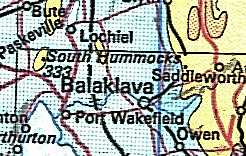
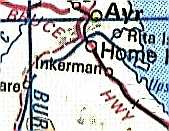
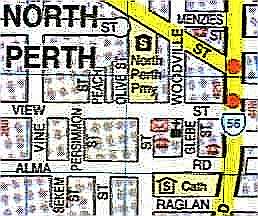
|
Town of Balaklava
in South Australia
|
Town of Inkerman
in Queensland
|
Alma and Raglan
Streets in Perth (Western Australia)
|
The Crimean War left a huge impact
on the Australian society, and not only on formation and realization of
its defense doctrine, but also on its political self-consciousness and
consolidation, maturing of the ideas of Australian nationalism what later
led to foundation of the Australian Federation. As to the image of Russia
in the Australian minds, alas, nearly three years of daily anti-Russian
propaganda had not added much to their knowledge, on the contrary, at the
time a consistent set of negative stereotypes of Russia and the Russians
settled for long in their consciousness. A century after these feeling
will ignite again during the so called Cold War.
Back to contents




